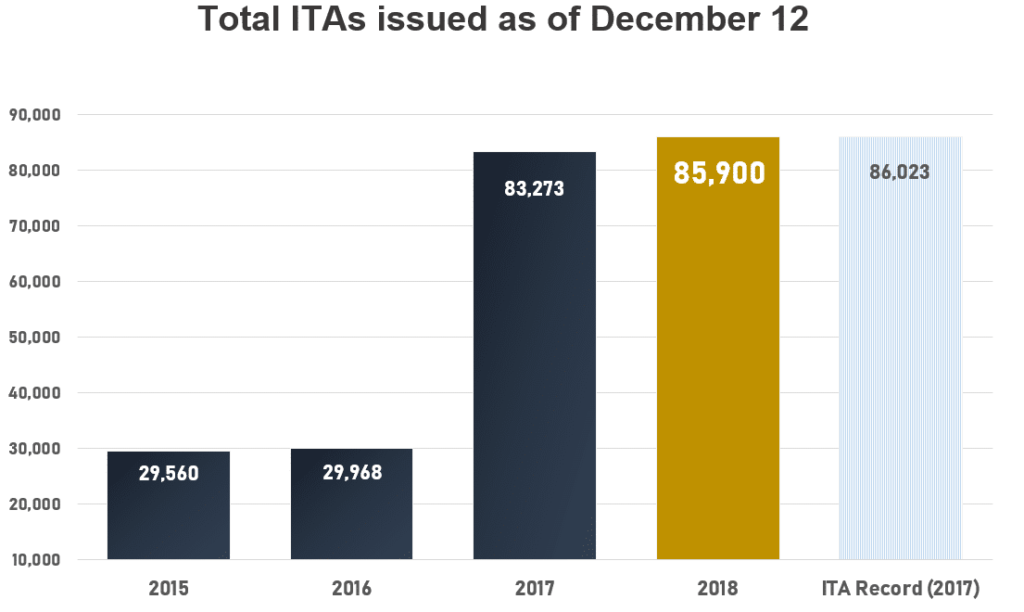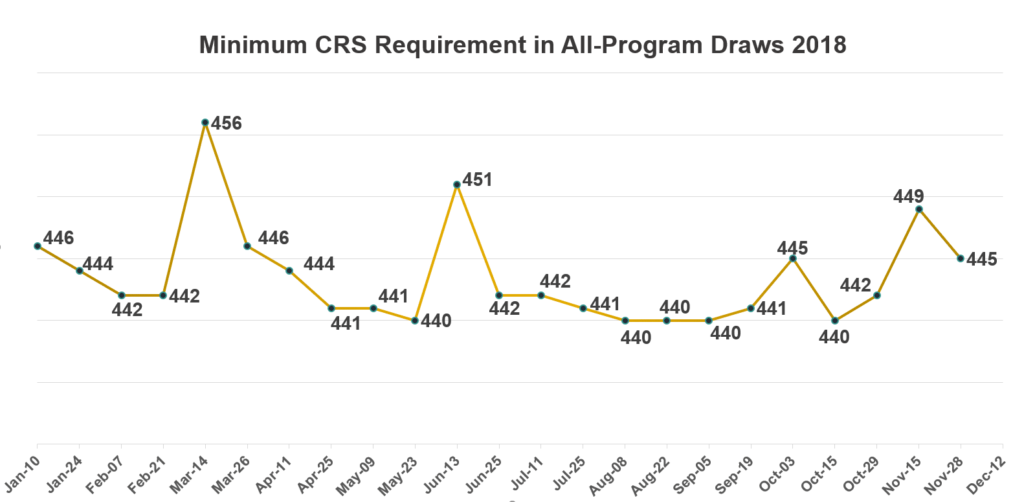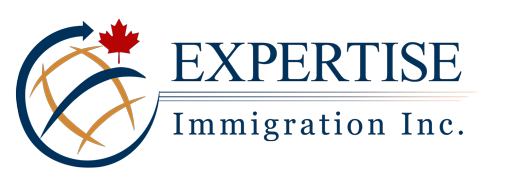The Government of Canada moved another step closer to surpassing the record for invitations issued in a single year through the Express Entry economic immigration system with a new draw held Wednesday.
The 3,900 invitations to apply for Canadian permanent residence (ITAs) issued today puts the total number issued in 2018 at 85,900 — just 123 shy of last year’s record-setting ITA total of 86,023.
The minimum score in today’s draw was 445, the same as the previous draw on November 28.
Immigration, Refugees and Citizenship Canada (IRCC) typically holds an Express Entry invitation round every two weeks, which means another draw is possible this year and 2017’s ITA record could fall.
At this same point in 2017, IRCC had issued 83,273 ITAs and finished the year with a draw on December 20.

The federal Express Entry system manages the pool of candidates for Canada’s three Federal High Skilled economic immigration programs — the Federal Skilled Worker Class, Federal Skilled Trades Class and Canadian Experience Class.
Eligible candidates are given a ranking score based on factors such as age, education, work experience and proficiency in English or French. This score determines their position in the Express Entry pool, and a set number of the highest-ranked are issued ITAs through regular draws from the pool.
To find out if you are eligible to enter the Express Entry pool, fill out a free assessment.
IRCC used its tie-break rule in the December 12 draw. The time stamp used was November 28, 2018, at 09:51:43 UTC. This means that all candidates with a CRS score above 445, as well as those candidates with scores of 445 who entered their profile in the Express Entry pool before November 28, 2018, at 09:51:43 UTC, received an ITA in this invitation round.
Express Entry’s Comprehensive Ranking System (CRS) provides additional points for factors such as arranged employment, a sibling living in Canada or a nomination through an Express Entry-linked Provincial Nominee Program (PNP) stream.
A provincial nomination is the most valuable factor under the CRS and results in an additional 600 points. With minimum scores ranging as low as 440 for all-program draws in 2018, these 600 points would effectively guarantee an ITA.

All nine Canadian provinces and two territories that participate in Canada’s PNP have at least one immigration stream that is linked to the Express Entry system.
Data from IRCC for the first eight months of 2018 show invitations to Express Entry candidates with a provincial nomination totalled 12 per cent of all ITAs issued during that period, up from nine per cent during that same period in 2017.
This increase reflects the PNP’s growing importance under IRCC’s new multi-year immigration levels plan, which has admissions through Canada’s PNP set to rise to 61,000 — an increase of 6,000 over 2018’s target of 55,000.
By 2021, admissions through the PNP are expected to reach 71,300 — an increase of nearly 30 per cent over this year’s Federal High Skilled target of 55,000 new permanent residents.
IRCC’s 2019 target for admissions through its Federal High Skilled immigration category is also set to rise in 2019 to 81,400, an increase of 6,500 over 2018’s target of 74,900.
The majority of candidates admitted to Canada through the Federal High Skilled category have their applications for permanent resident status processed through the Express Entry system.
The following are hypothetical examples of candidates who would have obtained an ITA in the December 12 draw:
Damien is 32 and holds a Bachelor’s degree as well as a two-year diploma. He has been working for five years as a finance clerk overseas. He took the IELTS exam and scored a 7 in Writing, Speaking and Reading and an 8 in the Listening. Although he has never worked or studied in Canada, his CRS score of 446 would have been sufficient to obtain an ITA in today’s draw.
Laurie and Jeremy are both 30 years old and hold a Bachelor’s degree and a one-year certificate from their studies outside Canada. Both have been working for the past three years as consultants. After taking the IELTS exam, Laurie scored a 7 in Speaking and Writing, and a 7.5 in Reading. She obtained an 8 in Listening. Jeremy, on the other hand, a obtained an IELTS 5 in Reading and Speaking, respectively, and a 5 in Listening. His writing score was 6.
Laurie applied as the principal applicant. While neither of them had worked or studied in Canada, their CRS score of 445 would have been sufficient to obtain an ITA in today’s draw.
“It’s now down to the wire to see if IRCC will break its ITA record this year,” said David Cohen, senior partner with the Campbell Cohen Canadian immigration law firm in Montreal. “A new record would be a fitting way to end what’s been a pivotal year in the development of Canada’s Express Entry system.”
To find out if you are eligible to enter the Express Entry pool, fill out a free assessment form.
Reference: Express Entry on the verge of breaking ITA record with latest draw

